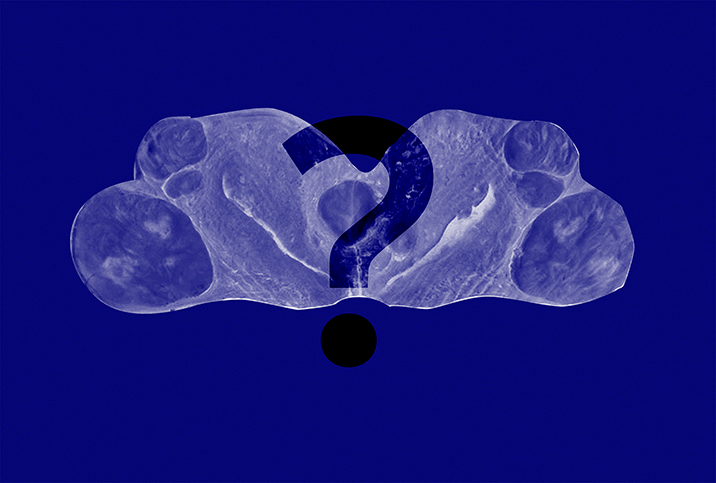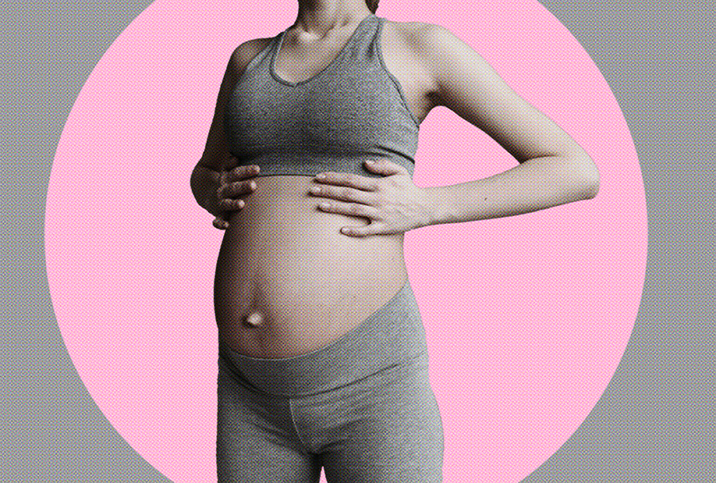Your Toolkit for Surviving Fibroids

Before my fibroid diagnosis this year, I had never heard of leiomyomas (another name for uterine fibroids). This is quite astonishing considering 80 percent or more of people with uteruses will develop the noncancerous growths, with Black people being three times more likely to develop fibroids. There's been little research on the cause of the condition and a cure hasn't been found.
Although I was only diagnosed with a fibroid this summer, the benign muscle tumor had been growing in my uterus unbeknown to me for three years. I'd been suffering from fibroid symptoms the entire time, including heavy and long menstrual bleeding, painful cramping, unbearable bloating, a protruding belly and uncomfortable pressure.
Unfortunately for me and many others, my health insurance won't pay for a laparoscopic myomectomy, as they don't consider the surgery to be medically necessary. So I rely on a slew of products to make myself more comfortable and treat my fibroid naturally.
Problem: Lengthy menstruation
Many people with fibroids have excessive menstrual bleeding. "Heavy menstrual flow from fibroids can result in frequent sanitary pad or tampon changes. Prolonged skin contact with disposable sanitary products can cause contact dermatitis," said Ng Kai Lyn, MBBS, MMed, MRCOG, an OB-GYN at Gleneagles Hospital in Singapore. "Menstrual cups are a reusable option made of silicone or latex rubber and don't come into contact with the vulva."
To cope with a nonstop varying flow, I use two different-sized menstrual cups from the Saalt duo pack, which has a small and regular-sized cup. During phases when the bleeding is heavy, I'll wear the medium-sized period cup with period panties from Modibodi and Pure Rosy. As I usually wear them daily, I have more than 10 pairs of period panties in all sorts of styles and absorbances, from high-waisted full-coverage pairs to thongs.
On days when I'm miraculously not bleeding, I wear a thin period panty, as I may start bleeding again at any moment. When I'm spotting, I prefer to use the Cora period disc, as they feel less invasive and allow me to have mess-free sex.
To clean the period cups and discs, I boil them weekly for 10 minutes. For day-to-day use, I wash them with a gel designed to clean silicone products. If you need to clean your period products on the go, I recommend the biodegradable Lunette Intimate Wipes.
Problem: Painful cramping
I've been treated by seven gynecologists since I started exhibiting signs of fibroids and went undiagnosed for three years. All of those doctors recommend Advil for dealing with cramps. Anti-inflammatory drugs, like Advil, can help ease discomfort and heavy bleeding.
Heating pads are a fibroid sufferer's best friend, as they provide relief from symptoms and are very soothing. Buy a heating pad or hot water bottle to keep at home.
"A weighted heating pad brings ease to my muscles and allows my body to relax," said Lakisha Corbett, a 30-year-old Embodiment Coach in San Miguel de Allende, Mexico. "My heating pad always offers relief to my fibroid symptoms. I take it everywhere with me, even on vacation."
Keep a stash of single-use heat pads with you in case you start to feel pain while you're away from your home. "The soothing warmth from a hot pack can help relax the muscles of the uterus, which in turn helps reduce the sensation of cramps," Ng said.
There is also a more fun option for relieving discomfort. Orgasms relieve menstrual cramps, and I've found they also ease the pain of cramps caused by fibroids. As fibroid pain can make penetration uncomfortable, I recommend a clitoris stimulator. I use the Womanizer Premium Eco, but there are many options available.
Problem: Growing fibroids
Like many people with fibroids, I was told to get the Mirena IUD to ease my symptoms and stop the fibroid from growing. Five months later, my fibroid has grown and my menstrual bleeding hasn't stopped. Suffice to say, I regret getting the Mirena.
Various herbs and minerals have been recommended to me by gynecologists and medical doctors. Nicole E. Williams, M.D., founder of the Gynecology Institute of Chicago, suggests using a Diindolylmethane (DIM) supplement and blackstrap molasses to control the symptoms of fibroids. Williams noted, however, that "these may not treat the fibroid itself and have been used with varying degrees of efficacy to treat the symptoms of fibroids."
Some anecdotal reports indicate green tea can be a helpful treatment for fibroids. A 2013 study published in the International Journal of Women's Health found green tea extract significantly reduced fibroid growth.
"Green tea complex helped me to get rid of symptoms and even shrink [the fibroids] by a third," said Katja Dietze, a 55-year-old yoga teacher in Venice, Florida.
You may not be able to prevent fibroids altogether, but there are natural ways to alleviate symptoms. Other lifestyle changes, such as avoiding alcohol, lowering your blood pressure, getting enough vitamin D and avoiding sugar, may help. Talk to your doctor about a treatment that can work for you.


















